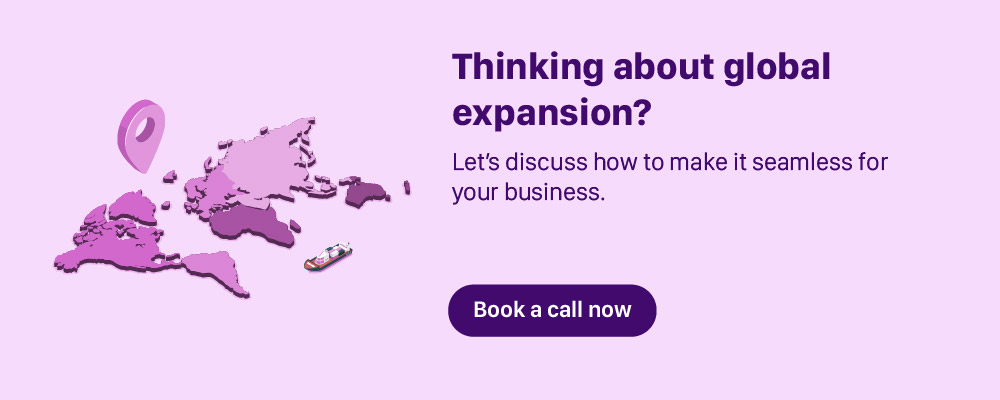Summary
International business expansion opens doors to new markets and growth opportunities but also brings challenges like regulatory compliance, currency risks, and cultural differences. This blog explores key international business challenges, including global workforce management, supply chain complexities, and financial risks.
Entering new markets presents a range of international business challenges that, if not effectively addressed, could delay success; it also provides access to a larger client base, more income possibilities, and better brand recognition.
From negotiating cultural differences in global organizations to guaranteeing adherence to international trade rules, businesses must be ready for a complicated terrain full of possibilities and hazards.
Political unrest, foreign exchange volatility, international tax compliance, cross-border labor management, and the legal complexity of multinational corporate activities all help to define the global business environment.
Even well-established companies might suffer from problems including language difficulties, supply chain interruptions, foreign market entrance tactics, and regional preference adaptation of marketing campaigns without appropriate planning.
Understanding International Business
Understanding what international business is all about and why businesses decide to go global will help one approach the difficulties of global business expansion. International business is all commercial activity, trade, investment, and operations, done across national boundaries. Exporting, importing, international direct investment (FDI), worldwide supply chain management, and cross-border e-commerce are just a few of the many pursuits it covers.
Through this blog, we will address the most frequently encountered difficulties with international business expansion. Knowing and addressing these issues aggressively contribute heavily toward the success of organizations entering foreign markets.
To make sure your firm survives in a competitive worldwide environment, let’s investigate the leading international business issues and learn ways to go beyond obstacles to global expansion.
Why Do Businesses Expand Internationally?
Companies pursue Remunance global expansion strategies for several reasons, including:
- Access to New Markets – Beyond national boundaries, businesses can reach newer prospects and boost income possibilities.
- Competitive Advantage – By broadening their market reach, companies who have presence in other nations help to remain ahead of their rivals.
- Cost Reduction and Resource Optimization – To improve profitability, companies can migrate manufacturing or outsourcing to nations with cheaper raw materials and lower labor prices.
- Diversification of Risk – Depending just on one market can be dangerous. Globally active companies can reduce risks associated with market saturation, geopolitical concerns, and economic downturns.
- Technological and Innovation Growth – Entering foreign markets usually helps businesses promote knowledge sharing, teamwork, and new technology access.
Types of International Business Activities
- Exporting and Importing – International commerce most often takes the form of sales of products and services across boundaries.
- Foreign Direct Investment (FDI) – Businesses fund overseas businesses, including subsidiaries or manufacturing sites.
- Licensing and Franchising – For royalties, companies let overseas partners utilize their brand, patents, or business ideas.
- Joint Ventures and Strategic Alliances – Companies team with foreign companies to enter a new market together with joint risks and gains.
- Global Outsourcing – Businesses choose foreign labor or suppliers in order to maximize output and control expenses.
These global commercial operations bring operational complexity, regulatory compliance difficulties, and cultural adaptation needs even as they offer growth prospects. Businesses that want to negotiate global expansion effectively have to get ready for the difficulties of working in foreign markets.
Key Challenges in International Business
Although entering global markets presents great prospects, companies also have to be ready for different foreign business obstacles that could affect operations, profitability, and long-term viability. The most immediate problems that organizations entering overseas markets encounter are listed below, together with solutions for them.
1. Cultural and Language Barriers
Overcoming cultural variations in worldwide business and linguistic barriers is one of the toughest challenges in the growth of international companies. Every nation boasts own conventions, traditions, business etiquette, and language of communication. Cross-cultural communication variances can cause misunderstandings that might result in bad marketing efforts, unsuccessful alliances, and poor negotiations.
Challenges:
- Variances in social conventions, corporate etiquette, and negotiating techniques.
- Language obstacles influence correspondence with clients, partners, and staff members.
- In marketing, misalignment results from regional consumer preferences and behavior.
Solutions:
- Create cross-cultural training courses to help staff members grasp regional traditions and business etiquette.
- Hiring local advisors who grasp the regional market or bilingual professionals will help you to leverage local talent.
- Customize marketing materials, product packaging, and websites to fit local languages and cultural quirks.
2. Compliance with International Regulations
Every nation has rigorous regulatory systems including taxes, employment laws, environmental policies, trade restrictions, industry-specific compliance. Ignoring foreign laws could lead to legal problems, fines, and damage of reputation.
Challenges:
- Knowing foreign legal standards, international commerce rules, and worldwide employment policies.
- Guaranturing intellectual property protection while working across several countries.
- Control of foreign tariffs and complicated import/export regulations.
Solutions:
- To negotiate legal complexity, team with foreign corporate lawyers or compliance professionals.
- Frequent assessment of activities helps to guarantee adherence to trade agreements and international business rules.
- Automated Compliance Software: Track changing rules and prevent expensive infractions using AI-driven compliance instruments.
3. Managing a Globally Distributed Team
Managing a remote workforce spread across the globe offers difficulties with regard to work culture, time zones, communication, and productivity when companies hire talent from many nations.
Challenges:
- Managing groups spread over several time zones.
- Guaranteeing consistent employee engagement and work culture.
- Overcoming distances to communicate remotely.
Solutions:
- For seamless team communication and project management, use Slack, Zoom, and Asana among remote collaboration tools.
- Create work plans that allow for varying time zones by means of flexibility in work policies.
- Cross-Cultural Team Building: Encourage inclusivity with programs involving diverse employee participation.
4. Currency Exchange and Inflation Rates
Global companies have to cope with foreign exchange risks, changing value of currencies, and economic uncertainty that could influence financial planning and pricing policies.
Challenges:
- Volatility of currencies influencing supply chains, price, and profitability.
- handling several markets’ multi-currency transactions.
- Dealing with inflation concerns in developing nations.
Solutions:
- Using foreign exchange hedging methods helps to reduce the risks of currency fluctuations.
- Install effective cross-border transaction-supporting payment gates.
- Expanding activities across several markets helps to lessen reliance on a single currency, so diversified revenue streams.
5. Supply Chain and Logistics Complexities
Managing an effective worldwide supply chain involves overcoming obstacles, including trade tariffs, customs policies, shipping rules, and unanticipated events (e.g., geopolitical concerns or natural catastrophes).
Challenges:
- Negotiating customs rules and trade obstacles abroad.
- Environmental, political, or financial considerations bring on unstable supply networks.
- Delays in cross-border shipments brought on by legal barriers.
Solutions:
- Diversity of Supply Chains: Steer clear of depending just on one production center or supplier.
- Advanced Logistics Technology: Track and control real-time supply chains using AI and blockchain.
- Cooperation with Global Freight Providers: Deal with foreign logistics firms knowledgeable in customs clearance and shipping policies.
These are just some of the key international business challenges that companies must tackle for successful global expansion. Let’s have a look at some additional ways to tackle international business challenges.
Winning Strategies to Overcome International Business Challenges
Globally isn’t easy. But with the correct techniques, challenges become chances. Here’s how to clear the most formidable obstacles in international business and position your business for success.
1. Embrace Cultural Intelligence
Every nation does business in its unique manner. What appeals in one market could not in another. Knowing cultural variations will assist you in avoiding mistakes and creating solid bonds.
How to Get It Right:
- Study local business etiquette, including greetings, decision-making techniques, and negotiating tactics.
- See a local team member or consultant to help you with cultural quirks.
- Change Your Marketing: What appeals to Americans might not to Japanese consumers? Match your messaging, colors, and branding to local tastes.
Example: In some cultures, directness is appreciated. In others, it’s considered rude. Knowing the difference can make or break a deal.
2. Master Compliance & Regulations
Globally, business involves red tape. Every nation has its own trade prohibitions, labor laws, and tax policies. One mistake might result in fines or banishment from running there.
How to Stay Compliant:
- Do Your Homework: Investigating local corporate laws before entering a new market.
- Get Legal Help: Engaging an international business counsel to negotiate complex rules.
- Employ compliance software. To remain current, automatically track trade rules, employment legislation, and tax codes.
Example: Uber faced major hurdles in different countries due to labor law violations. If they had tailored their hiring models to local laws, they could have avoided legal battles.
3. Build a Strong Global Team
Managing a team across several time zones is difficult. Different work cultures, communication methods, and scheduling can all lead to anarchy. But given the correct strategy, you can create a top-notch worldwide workforce.
How to Keep Everyone Connected:
- Asana, Slack, and Zoom help remote teams stay in sync with one another.
- Plan overlapping work hours such that at least a few hours of shared availability span many time zones.
- Celebrate diversity while strengthening fundamental values that bind your team together in your unified company culture.
Example: Spotify allows flexible work hours for its global employees, ensuring smooth collaboration without forcing anyone into odd hours.
4. Manage Currency Risks Like a Pro
Exchange rates have swings. Your revenues show outstanding results one day and the next you are losing money due to declining values of currencies. Effective foreign exchange plans help to reduce these risks.
How to Protect Your Business:
- Make use of Multi-Currency Payment Solutions: Wise and Payoneer effectively manage foreign transactions.
- Lock in good rates to guard against unplanned losses from changing currencies.
- Spread Your Income: Run several locations to balance risk.
Example: Apple prices its products differently in each country, adjusting for currency shifts and inflation. You should too!
5. Simplify Supply Chain & Logistics
Global supply networks are brittle. Trade restrictions, political unrest, and shipping delays can all throw off delivery and drive expenses. You need a strong logistics plan if you want things to go as they should.
How to Keep Goods Moving:
- Work with reputable global logistics firms to simplify shipment in partnership with reliable freight providers.
- Spread out your risk by not depending just on one nation for manufacturing.
- Use smart technology: Blockchain and artificial intelligence can help monitor shipments in real time and clear congestion.
Example: During the pandemic, companies that sourced from multiple regions kept their supply chains running, while those relying on one country suffered significant delays.
Success in international business isn’t about avoiding challenges, it’s about adapting and staying ahead.
Conclusion – Turning Challenges into Global Success
Traveling internationally is no little accomplishment. It combines challenging tasks with interesting possibilities. Real challenges are cultural variances, legal obstacles, remote teams, currency concerns, and supply chains interruptions. They are nevertheless solvable with the correct approach though.
Here’s what to remember:
- Know the industry. Every nation is unique; so, change your strategy.
- Keep yourself legally compliant. See professionals to help you avoid fines and legal hotbeds.
- Create a worldwide connected team. Excellent communication crosses time and cultures.
- Control your financial hazards. Guard your gains using wise financial practices.
- Optimize logistics. A strong supply chain helps your company to run as it should.
Success in international business is about foreseeing and conquering obstacles rather than about avoiding them. Your business will flourish in worldwide marketplaces if you keep adaptable, forward-looking, and apply appropriate tools.
Recent
Related Blogs





